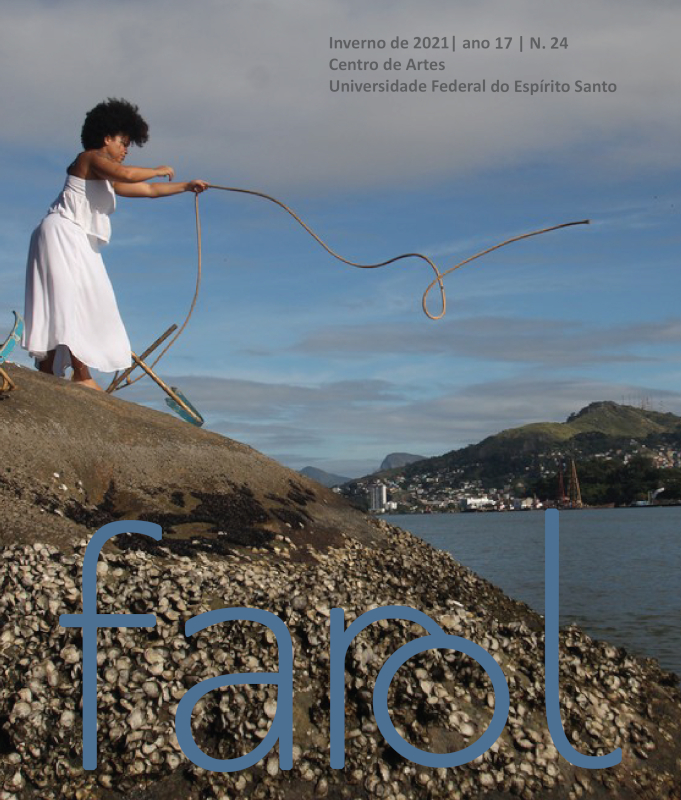Sobre políticas do corpo negro feminino e territorialidades jongueiras no enfrentamento ao racismo
DOI:
https://doi.org/10.47456/rf.v17i24.36407Palabras clave:
Jongos, territorialidades femininas, ancestralidade, circularidadeResumen
O presente texto destaca reflexões sobre políticas do corpo negro instituídas por mulheres jongueiras a partir de aproximações nas práticas culturais do Sapê do Norte. Busca desconstruir a representação estereotipada de subalternidade da mulher negra, enfatizando como as comunidades percebiam historicamente os processos de opressão racial e em contraponto criavam estratégias para fortalecer a liderança feminina. As questões de interseccionalidade de gênero são discutidas sob esse prisma, constituindo territorialidades e contextos de autoafirmação. Nas rodas de jongos o corpo é premissa da relação ancestral, da circularidade expressa nos ciclos geracionais interligando o passado e o presente por meio dos cantos e danças. É neste contexto que traçamos alguns paralelos sobre territorialidades femininas, ancestralidade, circularidade.
Descargas
Citas
AGUIAR, Maciel de. A divindade de São Benedito: o santo dos humildes e dos oprimidos. Revista Vitória, ano 1, n. 9, p. 46-53, jun. 1982.
AGUIAR, Maciel de. O mestre de jongo de São Benedito. In. AGUIAR, Maciel de.
Brincantes e quilombolas. São Mateus: Memorial, 2005.
AKOTIRENE, Carla. Interseccionalidade. São Paulo: Pólen, 2019.
ANDRADE, Patrícia Gomes Rufino. A educação do negro na comunidade de Monte Alegre/ES em suas práticas de desinvibilização da cultura popular negra. 2007. Dissertação (Mestrado em Educação) - Programa de Pós-Graduação em Educação, Universidade Federal do Espírito Santo, Vitória, 2007.
ANDRADE, Patrícia Gomes Rufino. Entre Jongos e Caxambus: Processos Educativos nas práticas religiosas afro-brasileiras. Tese – Programa de Pós-Graduação em Educação, Universidade Federal do Espírito Santo, 2013.
BASTIDE, Roger. As Américas Negras: as civilizações africanas no Novo Mundo. São Paulo: Difusão Européia do Livro; EDUSP, 1974.
BHABHA, Homi. In the Case of Making: Thougths on Third Space. In (Org) IKAS, Karen; WAGNER, Gehrard. Communicating in the Third, Space. New York: Routledge, 2009.
___. Introdução. In BHABHA, Homi. O Local da Cultura. Belo Horizonte: UFMG, 2010 a.
COLLINS, Patrícia Hill. Pensamento Feminista Negro. Tradução de Jamille Pinheiro Dias. Boitempo, São Paulo, 2019.
COLLINS, Patrícia Hill. Learning from the outsider within: The sociological significance of Black feminist thought. Social problems, v. 33, n. 6, p.14-32, 1986.
CRENSHAW, Kimberle. Demarginalizing the intersection of race and sex: A black feminist critique of antidiscrimination doctrine, feminist theory and antiracist politics. The University of Chicago Legal Forum, p.139-167, 1989.
GUIMARÃES. Aissa Afonso. Caxambu Alegria de Viver”: memória e patrimônio afro-brasileiro em Vargem Alegre (Cachoeiro de Itapemirim - ES). Trabalho apresentado na 29ª Reunião Brasileira de Antropologia. agosto de 2014, Natal/RN.
KILOMBA, G. Memórias da plantação: episódios de racismo cotidiano. Rio de Janeiro: Cobogó, 2020.
HAESBAERT, Rogério. Território e Multiterritorialidade: Um Debate. GEOgraphia, v. 9, n. 17, p.19- 45, 2007.
HOOKS, bell. E eu não sou uma mulher? Mulheres Negras e o Feminismo. Rosa dos tempos. Rio de Janeiro. 2020.
HOOKS, bell. Choosing the margin as a space of radical openness. Framework: The Journal of Cinema and Media, v. 36, p.15-23, 1989.
OLIVEIRA, Eduardo David de. Filosofia da Ancestralidade: Corpo e Mito na Filosofia da Educação Brasileira. Curitiba: Editora Gráfica Popular, 2007 a.
___. Ancestralidade na Encruzilhada. Curitiba: editora gráfica Popular, 2007 a.
PEREZ, Carolina dos Santos Bezerra. Juventude, música e ancestralidade no jongo: som e sentidos no processo identitário. 2005. Dissertação (Mestrado em Educação) - Programa de Pós-Graduação em Educação, Universidade de São Paulo, São Paulo, 2005.
RODRIGUES, Nina. As Raças Humanas e a Responsabilidade Penal no Brasil. Bahia. 1984.
SCOTT, J. C. Everyday forms of resistance. The Copenhagen journal of Asian studies, v. 4, p.33-33, 1989.
Descargas
Publicado
Cómo citar
Número
Sección
Licencia
Los autores de los trabajos enviados a Revista Farol autorizan su publicación en soporte físico y electrónico, únicamente con fines académicos, y podrán ser reproducidos siempre que se cite la fuente. Dan fe de su originalidad, autoría y originalidad.





